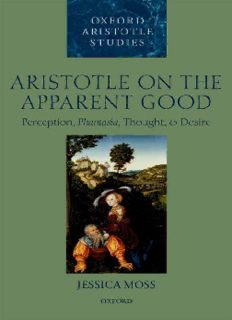Table Of ContentAristotle on the Apparent Good
oxford aristotle studies
GeneralEditors
JuliaAnnasandLindsayJudson
publishedintheseries
AristotleontheApparentGood
Perception,Phantasia,Thought,andDesire
JessicaMoss
Teleology,FirstPrinciples,andScientific
MethodinAristotle’sBiology
AllanGotthelf
PriorityinAristotle’sMetaphysics
MichailPeramatzis
DoingandBeing
AnInterpretationofAristotle’sMetaphysicsTheta
JonathanBeere
Space,Time,Matter,andForm
EssaysonAristotle’sPhysics
DavidBostock
AristotleonMeaningandEssence
DavidCharles
TimeforAristotle
UrsulaCoope
AristotleonTeleology
MonteRansomeJohnson
OnLocation
Aristotle’sConceptsofPlace
BenjaminMorison
OrderinMultiplicity
HomonymyinthePhilosophyofAristotle
ChristopherShields
Aristotle’sTheoryofSubstance
TheCategoriesandMetaphysicsZeta
MichaelV.Wedin
Aristotle’sDeInterpretatione
ContradictionandDialectic
C.W.A.Whitaker
Aristotle on the
Apparent Good
Perception, Phantasia,
Thought, and Desire
Jessica Moss
1
3
GreatClarendonStreet,Oxford,OX26DP,
UnitedKingdom
OxfordUniversityPressisadepartmentoftheUniversityofOxford.
ItfurtherstheUniversity’sobjectiveofexcellenceinresearch,scholarship,
andeducationbypublishingworldwide.Oxfordisaregisteredtrademarkof
OxfordUniversityPressintheUKandincertainothercountries
#JessicaMoss2012
Themoralrightsoftheauthorhavebeenasserted
Firstpublished2012
Impression:1
Allrightsreserved.Nopartofthispublicationmaybereproduced,storedin
aretrievalsystem,ortransmitted,inanyformorbyanymeans,withoutthe
priorpermissioninwritingofOxfordUniversityPress,orasexpresslypermitted
bylaw,orundertermsagreedwiththeappropriatereprographics
rightsorganization.Enquiriesconcerningreproductionoutsidethescopeofthe
aboveshouldbesenttotheRightsDepartment,OxfordUniversityPress,atthe
addressabove
Youmustnotcirculatethisworkinanyotherform
andyoumustimposethissameconditiononanyacquirer
BritishLibraryCataloguinginPublicationData
Dataavailable
LibraryofCongressCataloginginPublicationData
Dataavailable
ISBN 978–0–19–965634–9
printedinGreatBritainby
MPGBooksGroup,BodminandKing’sLynn
LinkstothirdpartywebsitesareprovidedbyOxfordingoodfaithand
forinformationonly.Oxforddisclaimsanyresponsibilityforthematerials
containedinanythirdpartywebsitereferencedinthiswork.
For Cian, who has read it all, and for Oscar and Una,
who do not have to read it.
This page intentionally left blank
Contents
Acknowledgements ix
Introduction xi
Abbreviations xvi
PART I. THE APPARENT GOOD
1. EvaluativeCognition 3
1.1 Desireandthegood 3
1.2 Practicalcognition 9
1.3 PracticalcognitioninthedeMotuAnimalium 11
1.4 PracticalcognitioninthedeAnima 16
1.5 Non-rationalfinding-good 20
2.PerceivingtheGood 22
2.1 Practicalcognitionandpleasure 22
2.2 Pleasureasvalue-perception 29
2.3 Perceivingthegoodassuch 30
2.4 Justdeflationaryenough 41
2.5 Highermodesofcognition 46
3.PhantasiaandtheApparentGood 48
3.1 Phantasiainaction 49
3.2 Phantasia:thebasicconceptionandbeyond 51
3.3 Practicalphantasia 57
3.4 Phantasiaandthought 64
PART II. THE APPARENT GOOD AND NON-RATIONAL
MOTIVATION
4. PassionsandtheApparentGood 69
4.1 Doxasticvs.phantasticaccountsofthepassions 70
4.2 Thepassionatepartofthesoul 71
4.3 PassionsintheRhetoric 75
4.4 Platonicprecedent 85
4.5 Firstdoxasticobjection:thecontentsofperception 87
4.6 Seconddoxasticobjection:acceptingvs.believing 90
4.7 AristotleandtheStoicsonphantasia,assent,andpassion 92
4.8 AristotleandtheStoicsonpassions,phantasia,andbelief 94
viii CONTENTS
5.AkrasiaandtheApparentGood 100
5.1 Apuzzleaboutakrasia 100
5.2 AkrasiaindeAnimaIII.9-10 103
5.3 Ethicalerrorandperceptualillusion 106
5.4 Followingappearancesagainstknowledge 112
5.5 Theillusionaccountofakrasia 118
5.6 NicomacheanEthicsVII.3 121
5.7 Ignoranceandstrugglerevisited 132
PART III. THE APPARENT GOOD AND RATIONAL
MOTIVATION
6. PhantasiaandDeliberation 137
6.1 Rationaldesire 137
6.2 Starting-pointsvs.calculations 141
6.3 Phantasiaandcalculations 142
7.Happiness,Virtue,andtheApparentGood 153
7.1 Phantasiaandthestarting-pointsofreasoning 153
7.2 Virtuemakesthegoalright 155
7.3 Virtueisnon-rational 163
7.4 Makingthegoalright 174
7.5 Phronesisandends 179
7.6 Theroleofphronesis 191
7.7 Phantasiaandthegoal 198
8.PracticalInduction 200
8.1 Inductionandhabituation 200
8.2 Habituationandpleasurableperception:anargument
fromfirstprinciples 201
8.3 Pleasureinperceivingthefine 206
8.4 Phantasiaofthegoal 219
8.5 Beyondphantasia:truesuppositionoftheend 223
Conclusion:Aristotle’sPracticalEmpiricism 234
Bibliography 236
Index 243
IndexLocorum 248
Acknowledgements
Ihavelearnedsomuchfromsomanypeopleovertheeightyearsittookmetowrite
this book that I am not sure where to start. Certainly I owe thanks for excellent
comments on various chapters at various stages from James Allen, Rachel Barney,
DavidBronstein,JohnCooper,KlausCorcilius,JamieDow,MalcolmHeath,Simon
Keller, Gabriel Richardson Lear, Hendrik Lorenz, Wolfgang Mann, Anthony Price,
Kieran Setiya, Damien Storey, Sergio Tenenbaum, Jennifer Whiting, Chris Young,
and the anonymous referees for OUP; I also got lots of help from audiences at
Pittsburgh, Texas, Toronto, USC, Leeds, Cambridge, and Oxford. Damien Storey
wasawonderfulindexerandproofreader.MygratitudetomycolleaguesatOxfordis
particularlyvividbecauseIseeup-closehowmuchelsetheyhavetodo:DavidCharles,
AngelaChew,UrsulaCoope,TerryIrwin,ThomasJohansen,ChrisShieldsandRalph
Wedgwood each read large chunks of the book and gave me enormously helpful
comments;BenMorisonandDavidBronsteinreadanddiscussedthedeMotuAnimal-
ium with me. The book owes a less direct but very large debt to my teachers: Sarah
Broadie,JohnCooper,AlexanderNehamas,andAllanSilvermanguidedmethrough
ancient philosophy when I was a student, and remain excellent models. I have been
lucky to have great undergraduate and graduate students in my seminars, reading
groups,supervisionsandtutorialsonAristotleatPittandOxford:ithasbeenapleasure
to learn with all of them. I am also sharply aware of my debt to other writers on
Aristotle: although I have tried faithfully to footnote them, it would take too many
footnotestoconveytheextenttowhichIamheredevelopingandexpandingonand
revisingideasothershavehad.WhileIhavelearnedenormouslyfromthoseIdisagree
with too, I want particularly to note here some authors whose views on Aristotle’s
ethicsandpsychologyIseemyselfaschampioning:DeborahAchtenberg,JohnBurnet,
ThomasTuozzo,andJenniferWhiting.Thecentralclaimofthisbook,thatthereisan
important connection between phantasia and the apparent good, is explored in Heda
Segvic’s work; I wish very much I could have discussed these ideas with her. I am
gratefultotheAHRCforagrantwhichgavemetimefinallytofinishthebook,tomy
colleagues at Balliol and in the philosophy faculty at Oxford for granting me leave
to use it, and to Adam Swift for handing down an excellent anti-procrastination
technique so I didn’t waste it. Very special thanks are due to Oscar and Una Dorr
for helping me not rush to press with the half-baked ideas I had when I first started
thisprojectandatmanypointsthereafter–andforbeingwonderful.Finally,andabove
all, I thank Cian Dorr. I can imagine no better philosophical critic, interlocutor, or
model,andIshuddertothinkhowmuchworsethisbook(tosticktothat)wouldbe
withouthim.
Description:Aristotle holds that we desire things because they appear good to us--a view still dominant in philosophy now. But what is it for something to appear good? Why does pleasure in particular tend to appear good, as Aristotle holds? And how do appearances of goodness motivate desire and action? No susta

